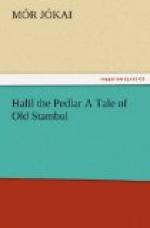the trembling, death-pale shapes, one by one, before
the face of Allah, and they all stand there as transparent
as crystal so that every thought of their hearts is
visible—what then will you answer, you
in whose power it once stood to uphold the dominion
of Mahomet, you to whom it was given to have swords
in your hands and ideas in your heads to be used in
its defence—what will you answer, I say,
when you hear the brazen voice cry: ’Ye
who saw destruction coming, did ye try to prevent
it?’ What will it profit you then, old Vuodi
and ye others, to say that ye never neglected the
Abdestan, the Guezuel, and the Thueharet ablutions,
nor the five prayers of the Namazat, that ye have
kept the fast of Ramazan and the feast of Bejram, that
ye have richly distributed the Zakato[14] and the
Sadakato,[15] that you have made the pilgrimage to
the Kaaba at Mecca so many times, or so many times,
that you have kissed the sin-remitting black stone,
that you have drunk from the well of Zemzem and seven
times made the circuit of the mountain of Arafat and
flung stones at the Devil in the valley of Dsemre—what
will it profit you, I say, if you cannot answer that
question? Woe to you, woe to everyone of us who
see, who hear, and yet go on dreaming! For when
we tread the Bridge of Alshirat, across whose razor-sharp
edge every true believer must pass on his way to Paradise,
the load of a single sin will drag you down into the
abyss, down into Hell, and not even into the first
Hell, Gehenna, where the faithful do penance, nor
into the Hell of Ladhana, where the souls of the Jews
are purified, nor into the Hell of Hotama wherein
the Christians perish, nor into the Hell of Sair which
is the abode of the Heretics, nor into the Hell of
Sakar wherein the fire-worshippers curse the fire,
nor yet into the Hell of Jahim which resounds with
the yells of the idol-worshippers, but into the seventh
hell, the deepest and most accursed hell of all, whose
name is Al-Havija, where wallow those who only did
God lip-service and never felt the faith in their
hearts, for we pray lying prayers when we say that
we worship Allah and yet allow His Temple to be defiled.”
These words deeply moved the hearts of all present. Every sentence alluded to the most weighty of the Moslem beliefs; the meshes of the net with which Halil had taken their souls captive were composed of the very essentials of their religious and political system, so they could but put their hands to their breasts, bow down before him, and say:
“Command us and we will obey!”
Then Halil, with the inspiration of a seer, addressed the men before him.




